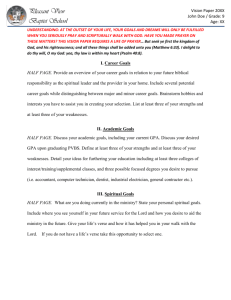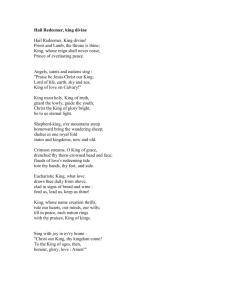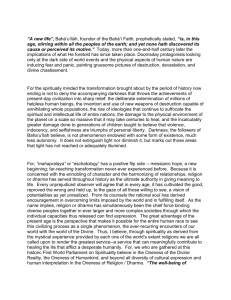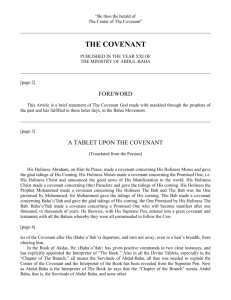Emotional Intelligence and Spiritual Development
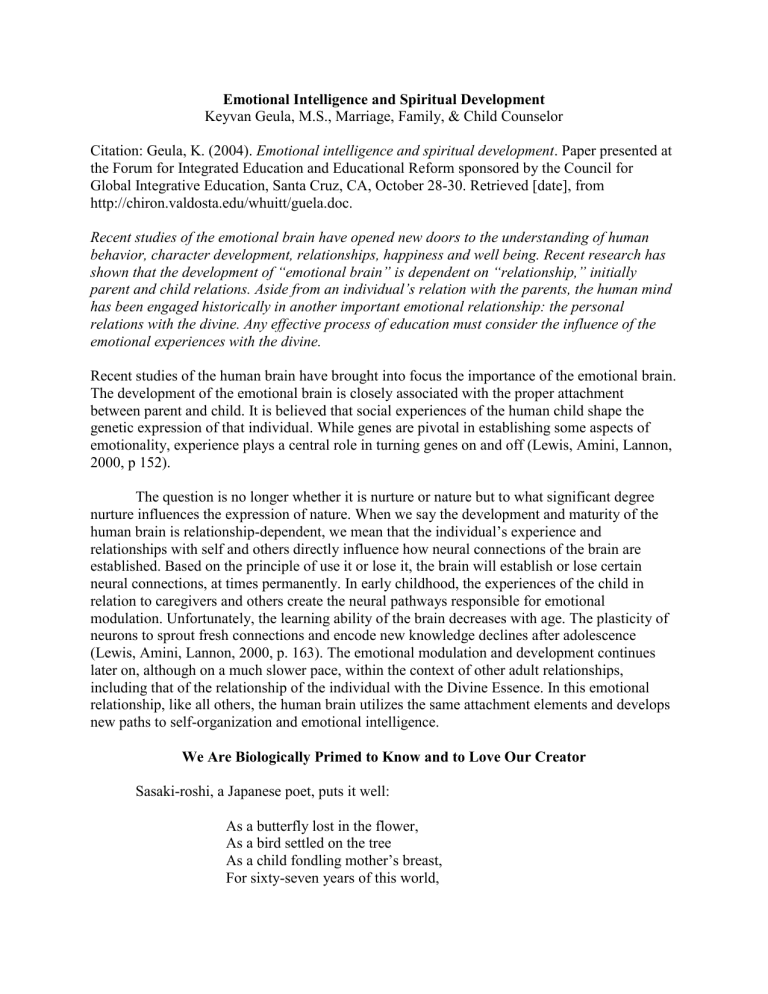
Emotional Intelligence and Spiritual Development
Keyvan Geula, M.S., Marriage, Family, & Child Counselor
Citation: Geula, K. (2004). Emotional intelligence and spiritual development . Paper presented at the Forum for Integrated Education and Educational Reform sponsored by the Council for
Global Integrative Education, Santa Cruz, CA, October 28-30. Retrieved [date], from http://chiron.valdosta.edu/whuitt/guela.doc.
Recent studies of the emotional brain have opened new doors to the understanding of human behavior, character development, relationships, happiness and well being. Recent research has shown that the development of “emotional brain” is dependent on “relationship,” initially parent and child relations. Aside from an individual’s relation with the parents, the human mind has been engaged historically in another important emotional relationship: the personal relations with the divine. Any effective process of education must consider the influence of the emotional experiences with the divine.
Recent studies of the human brain have brought into focus the importance of the emotional brain.
The development of the emotional brain is closely associated with the proper attachment between parent and child. It is believed that social experiences of the human child shape the genetic expression of that individual. While genes are pivotal in establishing some aspects of emotionality, experience plays a central role in turning genes on and off (Lewis, Amini, Lannon,
2000, p 152).
The question is no longer whether it is nurture or nature but to what significant degree nurture influences the expression of nature. When we say the development and maturity of the human brain is relationship-dependent, we mean that the individual’s experience and relationships with self and others directly influence how neural connections of the brain are established. Based on the principle of use it or lose it, the brain will establish or lose certain neural connections, at times permanently. In early childhood, the experiences of the child in relation to caregivers and others create the neural pathways responsible for emotional modulation. Unfortunately, the learning ability of the brain decreases with age. The plasticity of neurons to sprout fresh connections and encode new knowledge declines after adolescence
(Lewis, Amini, Lannon, 2000, p. 163). The emotional modulation and development continues later on, although on a much slower pace, within the context of other adult relationships, including that of the relationship of the individual with the Divine Essence. In this emotional relationship, like all others, the human brain utilizes the same attachment elements and develops new paths to self-organization and emotional intelligence.
We Are Biologically Primed to Know and to Love Our Creator
Sasaki-roshi, a Japanese poet, puts it well:
As a butterfly lost in the flower,
As a bird settled on the tree
As a child fondling mother’s breast,
For sixty-seven years of this world,
I have played with God.
A recent interdisciplinary scientific report called Hardwired to Connect claims that the human brain is biologically primed in its basic structure and system to connect to the spiritual reality and also to others. There is much to be studied on the moderating impact of spirituality and human emotions especially in relation to challenging life events, mastery of self, curbing harmful appetites, being worthy of trust, and lasting happiness. Martin Seligman, a University of
Pennsylvania psychologist, proposed: “For the last thirty or forty years we’ve seen the ascendance of individualism and a waning of larger belief in religion, and in supports from the community and extended family. That means a loss of resources that can buffer you against setbacks and failures. To the extent you see a failure as something that is lasting and which you magnify to taint everything in your life, you are prone to let a momentary defeat become a lasting source of hopelessness. But if you have a larger perspective, like a belief in God and in afterlife, and you lose your job, it’s just a temporary defeat.” (Goleman, 1995, p. 241).
The lessons from attachment research can guide our understanding about the powerful effect all interpersonal relationships can have on the development of the brain, the ongoing functioning of self regulation, and character development. The personal friendship and love relations with an All-Loving, All-Knowing Creator, like all other attachment relations such as romance, friendship and therapist-client relationship, may facilitate new orbitofrontal development and enhance the regulation of emotions throughout the lifespan (Siegel, 1999, p.
285). The seed of this relationship is planted by the mother’s prayerful communion during pregnancy and later the child’s experience of the mother’s spiritual attachment and exchange with the Beloved. Based on the relationship-dependent nature of the brain, one can argue that the development of the brain is also influenced by the individual’s relation with the Divine Spirit directly and indirectly.
Spiritual Experience Enhances Emotional Intelligence
Spiritual education, therefore, implies the existence of an emotional relationship with the divine or personal object of one’s worship and devotions called God, Allah, Yahweh,
Unknowable Essence, Heaven, Tao, etc. The divine luminaries of the human civilization such as
Moses, Jesus, Muhammad, Buddha, Krishna, The Bab and Baha’u’llah have been the perfect mirrors of this personal relationship and its transforming influence. Mothers, beginning with conception, are the first educators of human spiritual nature through their emotional shared experience with their offspring. Prayer is an emotional engagement and relations process. More research is needed into the physical, mental, and spiritual powers of prayer and meditation.
Abdu’l-Baha writes: “Meditation is the key for opening the doors of mysteries.” Although the power of meditation is a mystery to man, its impact in self-mastery and regulation, creativity and discoveries is as old as man.
The process of personal devotions, prayer, prayerful meditation and religious fervor and experience also utilizes the same attachment elements that help create new neural pathways responsible for emotional modulation and mastery (Siegel, 1999). Self regulation, which is seen as fundamentally emotion regulation, is the essence of spiritual development. “Emotional
communication whether with one’s parents or the object of one’s devotions in prayer is the fundamental manner in which one mind connects with another” (Siegel, 1999).
An early habit of prayer and prayerful meditation accelerates the person’s ability for emotional regulation. Emotional regulation is at the heart of effective character development and education, self restraint, self mastery and development of divine virtues. “Empty the boat of your life, O man; when empty it will swiftly sail. When empty of passion and harmful desires you are bound for the land of Nirvana.” Buddhism: Dhammapada 369
Character Education and Emotional Intelligence
Self Science, an emotional intelligence curriculum, is in harmony with the objectives of character education. Its focus is to develop self awareness, in the sense of recognizing feelings and building a vocabulary for them and seeing the links between thoughts, feelings, and reactions; knowing if thoughts or feelings are ruling a decision; seeing the consequences of alternative choices; and applying these insights to decisions about such issues as drugs, smoking, and sex. Self awareness also takes the form of recognizing your strengths and weaknesses, and seeing yourself in a positive but realistic light.
Another emphasis is managing emotions: realizing what is behind a feeling (for example, the hurt that triggers anger), and learning ways to handle anxieties, anger, and sadness. Still another emphasis is on taking responsibility for decisions and actions, and following through on commitments. A key social skill is empathy, understanding others’ feelings and taking their perspective, and respecting differences in how people feel about things. Relationships are a major focus, including learning to be a good listener and question asker; distinguishing between what someone says or does and your own reactions and judgments; being assertive rather than angry or passive; and learning the arts of cooperation, conflict resolution, and negotiating compromise (Goleman, 1995 p. 268).
The Love Relation with the Creator and Emotional Intelligence
The love relation with the creator infuses the world of existence with an emotional charge. Albert Einstein refers to this emotional experience of the mystical nature as follows:
“The most beautiful and profound emotion we can experience is the sensation of the mystical. It is the sower of all true science. He to whom this emotion is a stranger, who can no longer wonder and stand rapt in awe, is as good as dead. To know that what is impenetrable to us really exists, manifesting itself as the highest wisdom and the most radiant beauty, which our dull faculties can comprehend only in their primitive form—this knowledge, this feeling, is at the center of true religion.” (Albert Einstein, quoted in The Enlightened Mind, an Anthology of
Sacred Prose , edited by Stephen Mitchell p. 191.)
Looking at the world as the expression of divine love elevates nature and gives it meaning in a greater context. To see existence, including one’s own, as an expression of the divine attributes of love, power, might, beauty and meaning is uplifting and comforting to say the least. Looking at the world as the handiwork of the Beloved places humanity in a most mighty
loving embrace, elevating our self concept, and increasing the sense of belonging and feeling loved by an Almighty, All-Knowing, All-Wise focus of love.
Baha’u’llah, one of the great spiritual teachers of our time, offers the following emotional intimation in a supplication and prayer: “I am well aware, O my Lord, that I have been so carried away by the clear tokens of Thy loving-kindness, and so completely inebriated with the wine of
Thine utterance, that whatever I behold I readily discover that it maketh Thee known unto me, and it remindeth me of Thy signs, and of Thy tokens, and of Thy testimonies. By Thy glory!
Every time I lift up mine eyes unto Thy heaven, I call to mind Thy highness and Thy loftiness, and Thine incomparable glory and greatness; and every time I turn my gaze to Thine earth, I am made to recognize the evidences of Thy power and the tokens of Thy bounty. And when I behold the sea, I find that it speaketh to me of Thy majesty, and of the potency of Thy might, and of Thy sovereignty and Thy grandeur. And at whatever time I contemplate the mountains, I am led to discover the ensigns of Thy victory and the standards of Thine omnipotence.” (Baha'u'llah,
Prayers and Meditations by Baha'u'llah, p. 271).
The uninhibited, unconditional nature of personal devotions opens the door for a wider range of emotional expression, brain development and sophistication. Any education that leaves out the critical role of this mysterious relationship ultimately undermines the full development of the human mind and brain, leaving the individual unprepared to handle the challenges of actualizing his or her human potential.
The loving relations of man with an all Loving Creator raises up the standard of education and station of the educators and students alike. The unconditional experience of spiritual relations provides an elevated expectation of a teacher as a healing physician, a loving gardener, a caring mentor. It also uplifts the reality of the students from an amalgamation of lower appetites resisting to be controlled and regulated to a treasure house of divine potential waiting to be discovered and polished to show its powers and beauty.
The Disharmony Between Religion and Science
The disputes within religions and misunderstandings between our perception of science and religion have polarized human culture and life experience. As a consequence of this manmade conflict, the baby is thrown out with the bath water and education is left without the guiding light of divine spirit and love. As a result, whatever morality and character education is taught in schools has been mostly without a heart, emotionally sterile and mainly a cognitive process. The emotional experience of sharing one’s love for the divine has primarily been off limits in the school environment. Because learning mostly takes place in a context of feelings, education without concern for the role of emotions, particularly moral education, is handicapped to do its critical job.
There Is No Place in Schools for Emotional Experience of Divine Love
Our response to intra-religious degradation and disintegration and polarization between religion and science has resulted in the banning of a shared emotional attraction and experience
from the centers of learning. Schools are mainly a place for the cognitive experience provided by science.
This short sighted solution has led to the segregation of the two wings of human mind: knowing and loving. To partake of the spiritually, the cohesive sense of shared values and emotionally bonding experience in learning, children only have their parents and the limits of their segregated religious community to turn to. The message is that the school is off limits to the emotional expressions of shared values, the emotional context of learning right from wrong.
Spiritual love, which is unique to the human spirit and vital to its growth, is banned from the centers of learning while all other forms of love which have to do with the lower nature and its appetites, such as love of power, money, status, comfort, etc., are ushered in to fill up the vacuum. The result is that the student’s heart is robbed by these lower loyalties and identities.
Herein lies the seed of the epidemic of emotional problems and disabilities in our youth.
The critical influence of self-organization of the developing brain which must occur in the context of a relationship with another self, another brain, is missing or severely undermined in traditional education. We now know that any relational context can be either growthfacilitating or growth-inhibiting, and so it imprints into the developing right brain either a resilience against or a vulnerability to forming psychiatric disorders later in life ( Hard Wired to
Connect p. 16). We also sadly observe that the teacher-student relationship has a big and deep hole in its soul. Moral education divorced from a spiritual and emotional context becomes, at best, superficial and ultimately an inoculation against creating morally fortified and resilient individuals and societies.
Education Without Emotional Context Struggles to Bear its Ultimate Fruit
The segregation of the expression of universal love towards the one and only Unifier of humanity has also backfired in further alienating hearts from one another and undermining the global emotional benefits of a shared sense of values and universal emotional experience and attachment. If schools teach moral education, it is mostly through an unemotional, cognitive, culturally centered approach, further undermining the progressive laws of the oneness and equality of all humanity. The process of moral education through the explanation of the natural and logical consequence of good and bad behavior, in the global context of cultural relativism, does not go deep enough to produce individual behavior change backed by the shared emotional support of a universal code of ethics. Daniel Goleman observes: “The beliefs of the rational mind are tentative; new evidence can disconfirm one belief and replace it with a new one—it reasons by objective evidence. The emotional mind, however, takes its beliefs to be absolutely true, and so discounts any evidence to the contrary. That is why it is so hard to reason with someone who is emotionally upset: no matter the soundness of your argument from a logical point of view, it carries no weight if it is out of keeping with the emotional conviction of the moment. Feelings are self justifying with a set of perceptions and ‘proofs’ all their own.” (Goleman, 1995. p. 295).
In the age of abundance of information the missing wing is the love that must lift the spirit mobilizing one’s will towards self regulation and self discipline. Knowledge must be accompanied by self motivation to lead into self regulating actions.
The Importance of Arts and Right Brain Activities in Integrated Education
Arts, music, story telling and other right brain activities integrate the emotional color and flavor into the process of education. Daniel Goleman observes, “The logic of emotional mind is associative; it takes elements that symbolize a reality, or trigger a memory of it, to be the same as that reality. That is why similes, metaphors, and images speak directly to the emotional mind, as do the arts—novels, films, poetry, song, theatre, opera. Great spiritual teachers, like Buddha and
Jesus have touched their disciples’ hearts by speaking in the language of emotions, teaching in parables, fables, and stories. Indeed, religious symbols and ritual make little sense from the rational point of view; it is couched in the vernacular of the heart.” (Goleman 1995 p. 295).
China is Making a Move in the Right Direction
A recent article in the Los Angeles Times, “Shanghai Textbook Brings Love into Heart of Education,” explains the upcoming unprecedented changes in the high school curriculum to address some of the emotional intelligence concerns of Chinese students. The subject has to do with romantic love and how students may manage their involuntary emotions and have a healthy and safe attitude towards love. The article claims that thus far the way the subject of romantic love has been handled by the parents and school is to pretend it does not exist. In the meantime the director of the Juvenile Research Institute of Shanghai Academy of Social Sciences, Yang
Xiong, is expressing concern that the current wave of teenagers is hitting puberty about a year earlier, some as early as 11 years old. One 15 year old male student’s response to the text book change was that he did not want a big dose of it simply because “it is not going to be on the examination.” The question for the Chinese educators is how they might convince the students to consider the integration of their emotional and cognitive selves into one so long as the final exam focuses only on the cognitive brain.
A Positive and Joyous Environment Is Conducive to Better Learning and Happiness
An educator who knows the language of the student’s heart finds a way to teach.
All emotions are impulses to act. Anger makes us run, fear make us freeze, become alarmed, and ready for action to protect and defend. Happiness causes increased activity in the brain center that inhibits negative feelings and fosters an increase in available energy and reduction of anxiety. Among all emotions, happiness has a unique effect on the whole system, the mind as well as the body, which influences human will and therefore achievement of goals (Goleman,
1995. p.7).
However, children must be taught the difference between transient happiness and a lasting one. For example, play and exercise can help you feel happy but living a life with a greater purpose such as service to humanity and altruism deepens and maintains the nature of one’s happiness. A healthy diet, a balanced daily routine, cleanliness and exercise are all part of staying healthy in order to fulfill one’s greater purpose in life. The pursuit of physical health and beauty as an end in itself undermines the importance of our real and lasting happiness and is related to mental disorders of different sorts, causing much sadness and despair among the young generation.
Further, among the main causes of despair and pessimism in any relationship are criticism, contempt, defensiveness and putting up a wall. These are four disastrous ways of interacting that sabotage a person’s attempt to communicate with another (Gottman, 1994, p. 70).
Parents as well as educators must be trained in the skills of loving communication, conflict resolution and consultation, and taught to foster their use. The assumption that challenge and attack are the best modes of feedback and scholarly inquiry, though pervasive, does not fit within the frame of our need for connectedness and a happy brain (Tannen, 1998, p. 266). The brain downshifts in a hostile and unfriendly environment no matter what the reason.
In an integrated system of education, attention is paid to relational, intuitive knowledge as much as formal objective knowledge. It is just as important to value a child’s feelings about a material object such as a rock in a show-and-tell activity because her mom brought it from a trip
(relational), as is the molecular make up of that rock (objective) (Tannen, 1998, p. 260).
A school and learning environment is an organic mix governed by the universal laws of the oneness of all humanity and the oneness of mind, body, and spirit, with everyone and everything in it serving a greater purpose than their own selves. The higher and happy self naturally emerges when the physical environment is orderly, clean and pleasing to the eye. Right brain activities are associated with feeling joyous and encouraged. Nature and beauty is appealing to the soul and is a very important ingredient of a happy learning environment.
Exercise and play lifts the mood.
Conclusion
Real education must consider the whole child and the purpose of human life and civilization. Real education must acknowledge the spiritual and emotional development of the child; the importance and influence of the arts and real happiness on the education process; and integrate them into the curriculum and evaluation process. An integrated education of this nature will enable the students to connect through shared emotional experiences and to reach their full potential as the images of their higher selves, the divine.
Bibliography
Abdu’l-Baha, Foundation of Spiritual Education: Research of the Bahá’í Writings .
Prepared by the National Bahá’í Education Task Force, Published by National Spiritual
Assembly of the Baha’is of the United States, Wilmette, Illinois.
Baha'u'llah, Prayers and Meditations . Translated by Shoghi Effendi. Wilmette, Illinois:
Bahá’í Publishing Trust, 1962
Benson, H., Timeless Healing: The Power and Biology of Belief . 1997. New York, NY:
Simon & Shuster
Frammolino, R., “Shanghai Textbook Brings Love Into Heart of Education,” p. A3,
September 26, 2004, Los Angeles Times .
Goleman, D. Emotional Intelligence: Why it Can Matter More than IQ . 1995. New York,
NY: Bantam
Gottman, J. Why Marriages Succeed or Fail: and How You Can Make Yours Last . 1995.
New York, NY: Simon & Shuster
Institute for American Values. Hardwired to Connect: A New Scientific Case for
Authoritative Communities. 2003. New York, NY: Institute For American Values .
Lewis, T., Amini, F., & Lannon, R. A General Theory of Love.
2000. New York, NY:
Random House,
Rumi, J. Rumi a Spiritual Treasury , compiled by Juliet Mabey. Oxford, England: One
World.
Tannen, D. The Argument Culture: Moving from Debate to Dialogue.
1998. New York,
N Y: Random House
Siegel, D. The Developing Mind . 1999. New York, NY: Guilford Press.
Biography
Mrs. Keyvan Geula is the founder and director of Center for Global Integrated Education, Inc.
She is a licensed, Marriage, Family and Child Counselor, and Family Mediator in private practice in California. She specializes in the integration of psychotherapy and spirituality and offers training in US and abroad including Mainland China. She is an adjunct professor of
Marriage, Family and Intimate Relations at Citrus Community College. She serves as a cross cultural and moral education consultant and trainer to schools, educators, private organizations and parents. Mrs. Geula has served as a guest speaker for the LA county Superior Courts PACT
(Parent and Children Together) program. She is the producer and talk show host of the TV series
"Transforming Human Consciousness". She is married and is parent of 3 adult children and the grandmother of two.
Contact information:
President of Center for Global Integrated Education
Keyvan@geulafamily.org kgeula@cgie.org phone/fax: (909)625-5075 www.cgie.org
